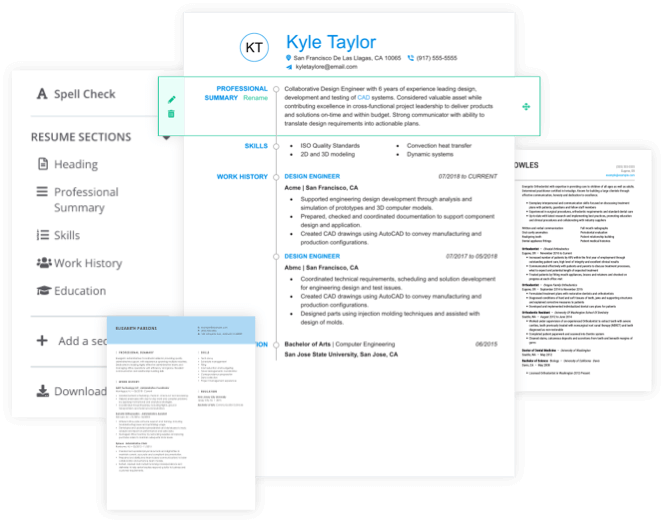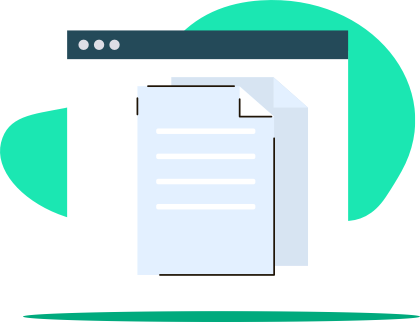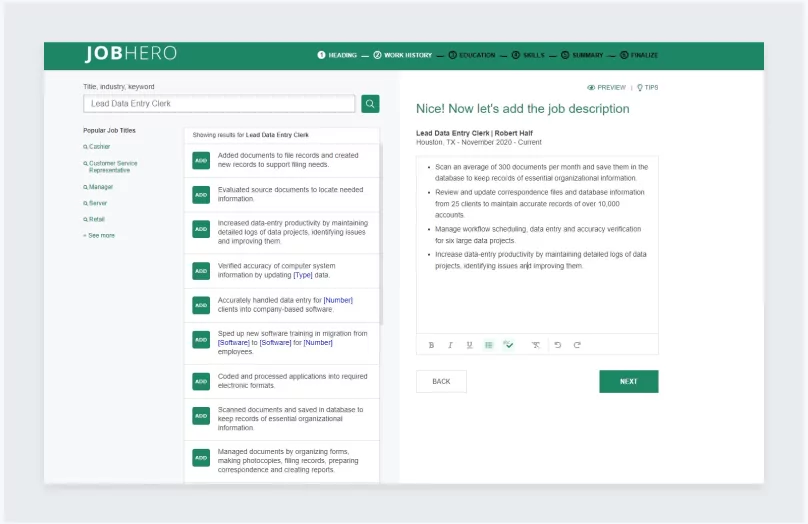- Featured in:

Mining engineers provide support to and manage mining operations, create estimates for mining projects, design mines, and assist with mining equipment selection. They are primarily hired by mining companies and conglomerates to work full-time shifts, usually during daytime business hours. Mining engineers ultimately report to mining operations managers and work independently with minimal supervision, but also function within a teamwork dynamic. They sometimes work within office environments, but frequently travel to various industry events and mining sites, and may travel for extended periods of time to complete their duties.
Need cover letter guidance? Add a cover letter to your resume using our cover letter formats how-to guide and add value to your resume.
Boost your resume with an extra click. Our cover letter templates match our resume templates’ designs for a cohesive application. Use a template in our builder to help you quantify and expand upon the experience from your resume and impress employers.
Mining Engineer Duties and Responsibilities
Daily duties for mining engineers vary based on the type of materials being extracted from the ground, the nature of the site where mining operations are being conducted, and the equipment and staff resources being made available by the hiring company. There are several core job tasks associated with this career, however, that are universally the same in spite of these variables.
Inspect Sites
Mining engineers inspect new and existing mining sites to determine the best ways to extract specific materials from the ground. This includes visiting sites in person and using maps and geological data to estimate material reserves.
Design Mines
Mining engineers design mines that allow workers to safely mine materials from the ground.
Plan Mining Projects
Mining engineers determine the staff members and equipment needed to successfully complete mining operations.
Manage Mining Operations
Mining engineers manage mining operations and supervise mining projects and staff to ensure projects are moving forward on schedule and within budget parameters.
Maintain Mining Equipment
Mining engineers troubleshoot, upgrade, and purchase mining equipment, and make decisions about the type of equipment that should be purchased to complete specific mining projects.
Evaluate Operations
Mining engineers evaluate ongoing mining operations. This includes writing reports regarding supplies, equipment, and mined materials.
Follow Safety Regulations
Mining engineers follow safety regulations set forth by the company and local, state, and federal laws.
Stay Up-to-Date on Technologies
Mining engineers stay up-to-date on new mining technologies, and attend conferences and workshops to learn about the latest mining equipment and industry developments.
Mining Engineer Skills and Qualifications
- Mechanical ability – mining engineers select and maintain mining equipment, which requires mechanical ability
- Communication – mining engineers use written communication skills to write reports on mining operations
- Analytical ability – mining engineers use excellent analytical abilities to design mines and mining operations
- Computer skills – mining engineers work with GPS and computer software programs to design and manage mining operations, which requires good computer skills
- Mathematics – mining engineers use math skills to make calculations to design mines, determine mining staff needs, and select appropriate equipment
- Management – mining engineers determine mine staffing needs, supervise mining staff, and make decisions regarding equipment purchases, upgrades, and repairs, tasks which require good management skills
Tools of the Trade
Mining engineers regularly work with these tools and equipment:
Ground testing tools (drills, scanners, probes)
Safety equipment (masks, goggles, helmets, gloves)
Surveying tools (maps, GPS, imaging equipment)
Mining Engineer Education and Training
Companies look for mining engineers who have, at minimum, a bachelor’s degree in engineering or a similar area of study. Many employers prefer mining engineers who have a master’s degree, or a bachelor’s degree in addition to past work experience in the mining industry.
Training is not typically provided to mining engineers, who have extensive education prior to being hired for the job. Mining engineers assume their normal work duties upon being hired in most cases.
Mining Engineer Salary and Outlook
Job data provided by the Bureau of Labor Statistics (BLS) shows that mining and geological engineers earned a median salary of $45.31 hourly and $94,240 annually in 2017. Mining and geological engineers occupied more than 7,000 jobs in 2016. According to BLS projections, this number will increase by eight percent from 2016 to 2026, an average rate of job growth.
Most companies provide medical benefits with dental insurance coverage to mining engineers. Worker’s compensation and disability benefits are typically provided as well. Some companies may offer monetary bonuses to mining engineers, in addition to salary, for exceeding mining operation goals.

Helpful Resources
Use these books and websites to find industry news updates, learn job strategies, and explore various mining engineer tips and techniques:
Society for Mining, Metallurgy & Exploration
explore upcoming events and professional development resources at this website dedicated to mining and metallurgy. This site also contains publications and resources to help professionals stay up-to-date on mining practices and technologies.
Human Factors for the Design, Operation, and Maintenance of Mining Equipment
equipment experts wrote this book to provide practical tips and techniques for mining engineers on the various types of mining equipment used in modern mining operations.
American Institute of Mining, Metallurgical, and Petroleum Engineers
get news updates, find professional events, discover training programs, and explore mining resources for mining engineers and other mining and extraction professionals at this website.
Guidelines for Mine Waste Dump and Stockpile Design
this book is a comprehensive guide to designing and monitoring mine waste dump sites, an integral part of mine design that mining engineers need to know.
National Mining Association
study up-to-date facts, data, and statistics relevant to the mining industry at this website, which also provides news and press releases.
Open Pit Mine Planning and Design, Two Volume Set & CD-ROM Pack, Third Edition
this is a complete, authoritative guide to designing and planning open pit mining operations. The text includes information about costs, equipment, and essential information for mining engineers.
Mining Engineer Resume Help
Explore these related job titles from our database of hundreds of thousands of expert-approved resume samples:




